Employability Skills Report: National Trust - Performance Analysis
VerifiedAdded on 2023/01/13
|18
|5532
|55
Report
AI Summary
This report delves into the realm of employability skills, specifically within the context of the National Trust, an organization dedicated to preserving cultural heritage. The assignment explores the development of personal responsibilities and performance objectives for a Visitor Welcome Manager, analyzing effectiveness and recommending improvements. It examines the application of motivational techniques to enhance employee performance and discusses strategies for problem-solving, communication, and time management. Furthermore, the report analyzes team dynamics, suggests alternative approaches to task completion, and evaluates tools for developing solutions to problems. The report provides insights into the impact of implemented strategies on business outcomes, demonstrating creative thinking and effective communication skills. The analysis covers a range of topics including personal effectiveness, working with others, negotiation, social skills, and assertiveness.
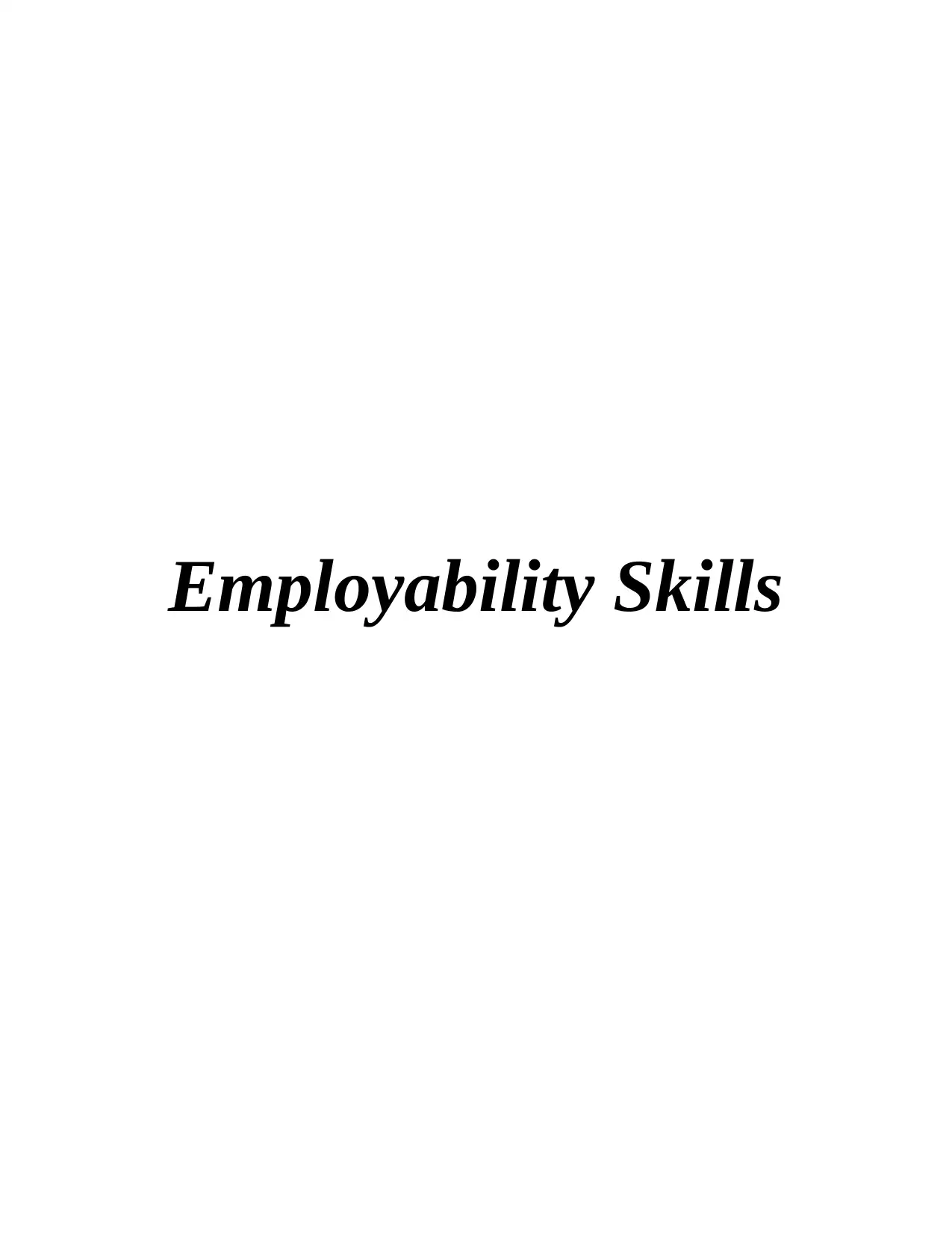
Employability Skills
Paraphrase This Document
Need a fresh take? Get an instant paraphrase of this document with our AI Paraphraser
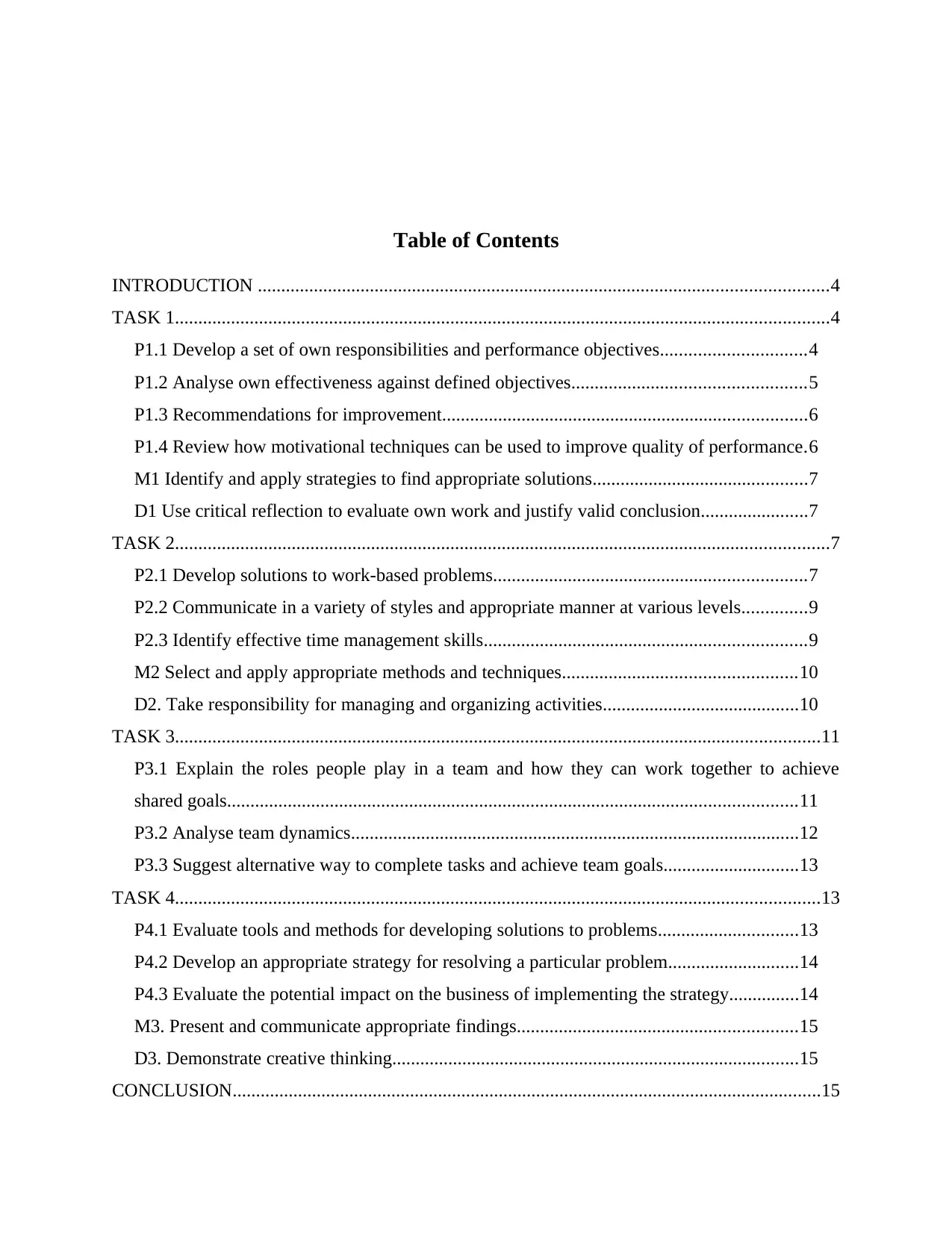
Table of Contents
INTRODUCTION ..........................................................................................................................4
TASK 1............................................................................................................................................4
P1.1 Develop a set of own responsibilities and performance objectives...............................4
P1.2 Analyse own effectiveness against defined objectives..................................................5
P1.3 Recommendations for improvement..............................................................................6
P1.4 Review how motivational techniques can be used to improve quality of performance.6
M1 Identify and apply strategies to find appropriate solutions..............................................7
D1 Use critical reflection to evaluate own work and justify valid conclusion.......................7
TASK 2............................................................................................................................................7
P2.1 Develop solutions to work-based problems...................................................................7
P2.2 Communicate in a variety of styles and appropriate manner at various levels..............9
P2.3 Identify effective time management skills.....................................................................9
M2 Select and apply appropriate methods and techniques..................................................10
D2. Take responsibility for managing and organizing activities..........................................10
TASK 3..........................................................................................................................................11
P3.1 Explain the roles people play in a team and how they can work together to achieve
shared goals..........................................................................................................................11
P3.2 Analyse team dynamics................................................................................................12
P3.3 Suggest alternative way to complete tasks and achieve team goals.............................13
TASK 4..........................................................................................................................................13
P4.1 Evaluate tools and methods for developing solutions to problems..............................13
P4.2 Develop an appropriate strategy for resolving a particular problem............................14
P4.3 Evaluate the potential impact on the business of implementing the strategy...............14
M3. Present and communicate appropriate findings............................................................15
D3. Demonstrate creative thinking.......................................................................................15
CONCLUSION..............................................................................................................................15
INTRODUCTION ..........................................................................................................................4
TASK 1............................................................................................................................................4
P1.1 Develop a set of own responsibilities and performance objectives...............................4
P1.2 Analyse own effectiveness against defined objectives..................................................5
P1.3 Recommendations for improvement..............................................................................6
P1.4 Review how motivational techniques can be used to improve quality of performance.6
M1 Identify and apply strategies to find appropriate solutions..............................................7
D1 Use critical reflection to evaluate own work and justify valid conclusion.......................7
TASK 2............................................................................................................................................7
P2.1 Develop solutions to work-based problems...................................................................7
P2.2 Communicate in a variety of styles and appropriate manner at various levels..............9
P2.3 Identify effective time management skills.....................................................................9
M2 Select and apply appropriate methods and techniques..................................................10
D2. Take responsibility for managing and organizing activities..........................................10
TASK 3..........................................................................................................................................11
P3.1 Explain the roles people play in a team and how they can work together to achieve
shared goals..........................................................................................................................11
P3.2 Analyse team dynamics................................................................................................12
P3.3 Suggest alternative way to complete tasks and achieve team goals.............................13
TASK 4..........................................................................................................................................13
P4.1 Evaluate tools and methods for developing solutions to problems..............................13
P4.2 Develop an appropriate strategy for resolving a particular problem............................14
P4.3 Evaluate the potential impact on the business of implementing the strategy...............14
M3. Present and communicate appropriate findings............................................................15
D3. Demonstrate creative thinking.......................................................................................15
CONCLUSION..............................................................................................................................15

REFERENCES..............................................................................................................................16
⊘ This is a preview!⊘
Do you want full access?
Subscribe today to unlock all pages.

Trusted by 1+ million students worldwide
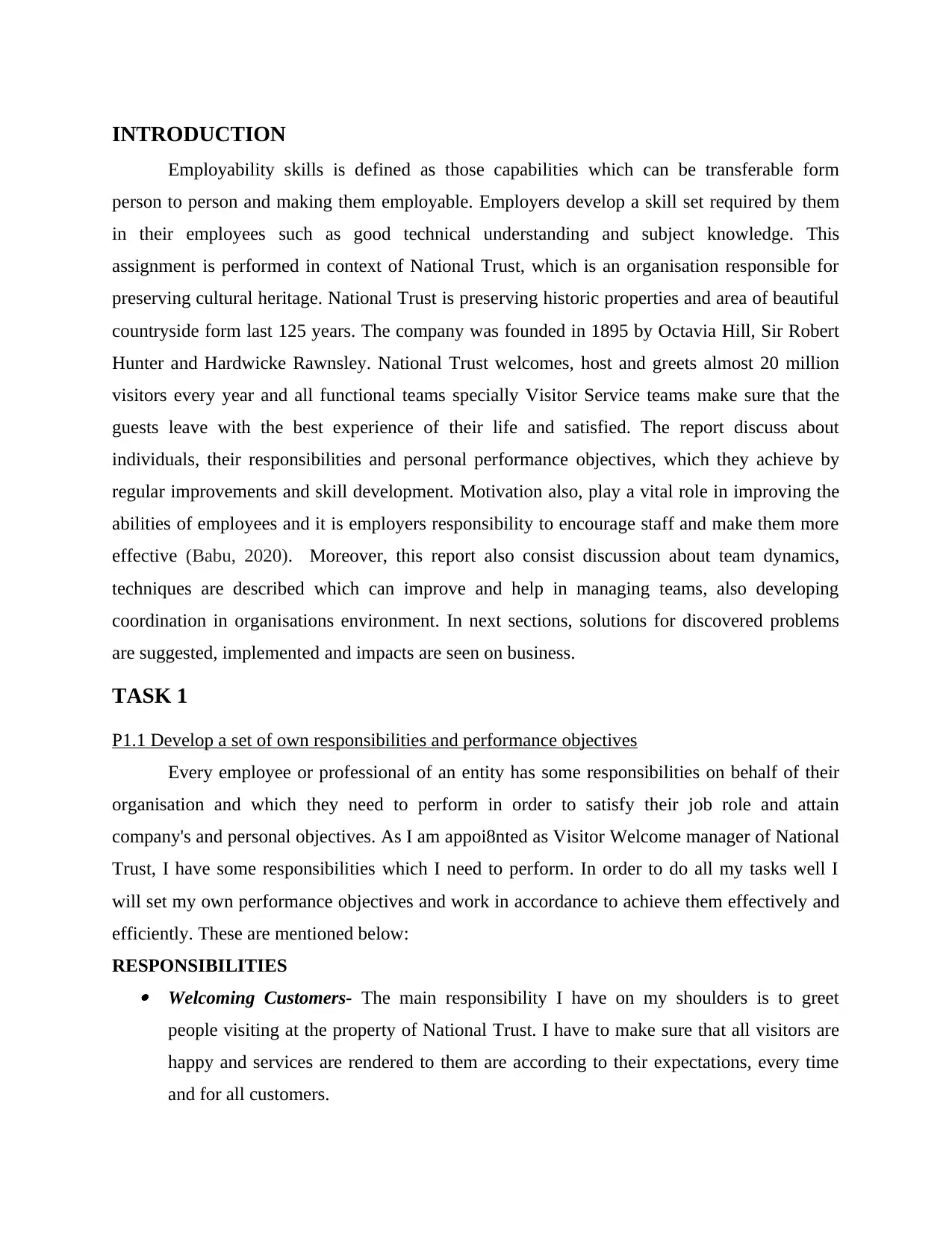
INTRODUCTION
Employability skills is defined as those capabilities which can be transferable form
person to person and making them employable. Employers develop a skill set required by them
in their employees such as good technical understanding and subject knowledge. This
assignment is performed in context of National Trust, which is an organisation responsible for
preserving cultural heritage. National Trust is preserving historic properties and area of beautiful
countryside form last 125 years. The company was founded in 1895 by Octavia Hill, Sir Robert
Hunter and Hardwicke Rawnsley. National Trust welcomes, host and greets almost 20 million
visitors every year and all functional teams specially Visitor Service teams make sure that the
guests leave with the best experience of their life and satisfied. The report discuss about
individuals, their responsibilities and personal performance objectives, which they achieve by
regular improvements and skill development. Motivation also, play a vital role in improving the
abilities of employees and it is employers responsibility to encourage staff and make them more
effective (Babu, 2020). Moreover, this report also consist discussion about team dynamics,
techniques are described which can improve and help in managing teams, also developing
coordination in organisations environment. In next sections, solutions for discovered problems
are suggested, implemented and impacts are seen on business.
TASK 1
P1.1 Develop a set of own responsibilities and performance objectives
Every employee or professional of an entity has some responsibilities on behalf of their
organisation and which they need to perform in order to satisfy their job role and attain
company's and personal objectives. As I am appoi8nted as Visitor Welcome manager of National
Trust, I have some responsibilities which I need to perform. In order to do all my tasks well I
will set my own performance objectives and work in accordance to achieve them effectively and
efficiently. These are mentioned below:
RESPONSIBILITIES Welcoming Customers- The main responsibility I have on my shoulders is to greet
people visiting at the property of National Trust. I have to make sure that all visitors are
happy and services are rendered to them are according to their expectations, every time
and for all customers.
Employability skills is defined as those capabilities which can be transferable form
person to person and making them employable. Employers develop a skill set required by them
in their employees such as good technical understanding and subject knowledge. This
assignment is performed in context of National Trust, which is an organisation responsible for
preserving cultural heritage. National Trust is preserving historic properties and area of beautiful
countryside form last 125 years. The company was founded in 1895 by Octavia Hill, Sir Robert
Hunter and Hardwicke Rawnsley. National Trust welcomes, host and greets almost 20 million
visitors every year and all functional teams specially Visitor Service teams make sure that the
guests leave with the best experience of their life and satisfied. The report discuss about
individuals, their responsibilities and personal performance objectives, which they achieve by
regular improvements and skill development. Motivation also, play a vital role in improving the
abilities of employees and it is employers responsibility to encourage staff and make them more
effective (Babu, 2020). Moreover, this report also consist discussion about team dynamics,
techniques are described which can improve and help in managing teams, also developing
coordination in organisations environment. In next sections, solutions for discovered problems
are suggested, implemented and impacts are seen on business.
TASK 1
P1.1 Develop a set of own responsibilities and performance objectives
Every employee or professional of an entity has some responsibilities on behalf of their
organisation and which they need to perform in order to satisfy their job role and attain
company's and personal objectives. As I am appoi8nted as Visitor Welcome manager of National
Trust, I have some responsibilities which I need to perform. In order to do all my tasks well I
will set my own performance objectives and work in accordance to achieve them effectively and
efficiently. These are mentioned below:
RESPONSIBILITIES Welcoming Customers- The main responsibility I have on my shoulders is to greet
people visiting at the property of National Trust. I have to make sure that all visitors are
happy and services are rendered to them are according to their expectations, every time
and for all customers.
Paraphrase This Document
Need a fresh take? Get an instant paraphrase of this document with our AI Paraphraser
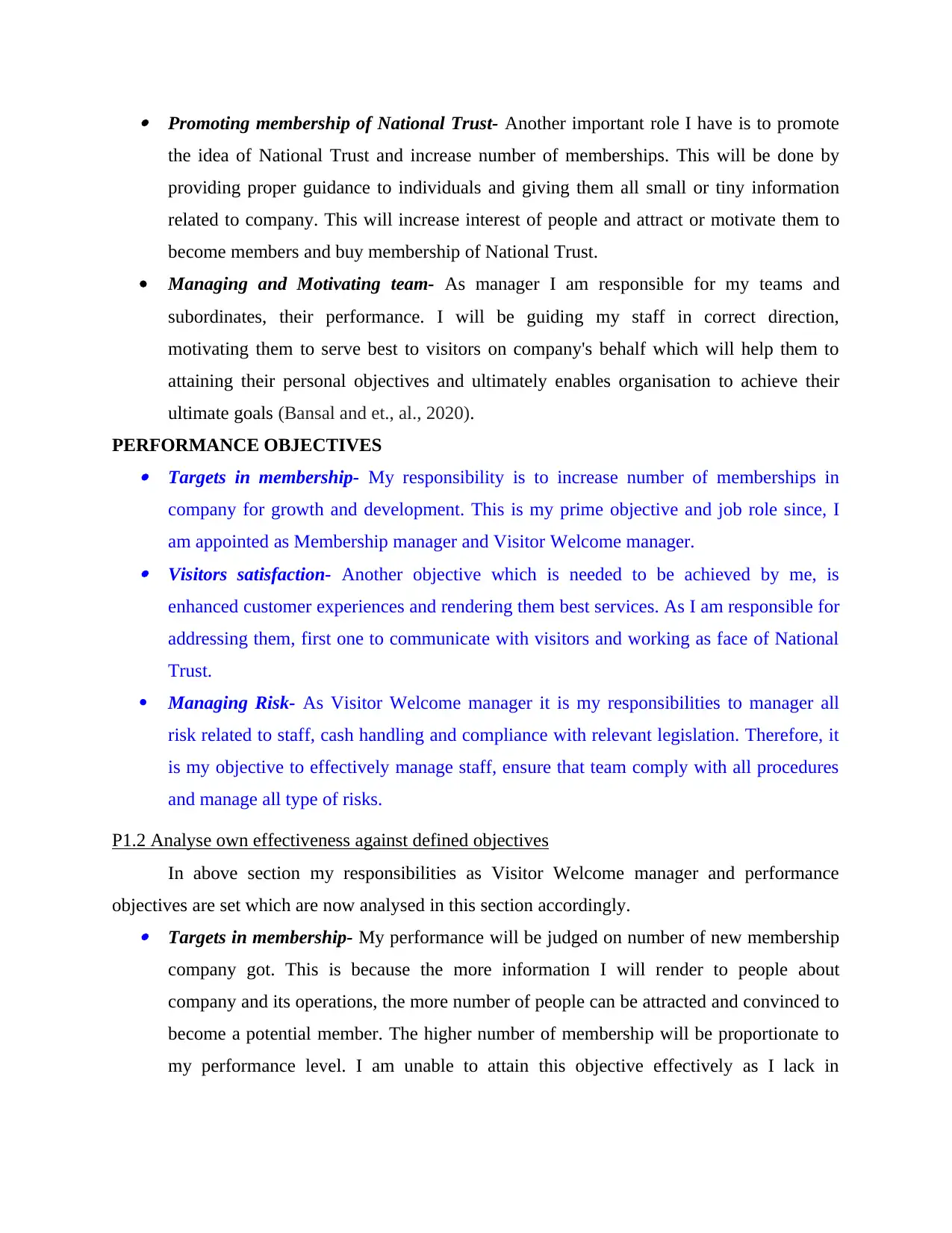
Promoting membership of National Trust- Another important role I have is to promote
the idea of National Trust and increase number of memberships. This will be done by
providing proper guidance to individuals and giving them all small or tiny information
related to company. This will increase interest of people and attract or motivate them to
become members and buy membership of National Trust.
Managing and Motivating team- As manager I am responsible for my teams and
subordinates, their performance. I will be guiding my staff in correct direction,
motivating them to serve best to visitors on company's behalf which will help them to
attaining their personal objectives and ultimately enables organisation to achieve their
ultimate goals (Bansal and et., al., 2020).
PERFORMANCE OBJECTIVES Targets in membership- My responsibility is to increase number of memberships in
company for growth and development. This is my prime objective and job role since, I
am appointed as Membership manager and Visitor Welcome manager. Visitors satisfaction- Another objective which is needed to be achieved by me, is
enhanced customer experiences and rendering them best services. As I am responsible for
addressing them, first one to communicate with visitors and working as face of National
Trust.
Managing Risk- As Visitor Welcome manager it is my responsibilities to manager all
risk related to staff, cash handling and compliance with relevant legislation. Therefore, it
is my objective to effectively manage staff, ensure that team comply with all procedures
and manage all type of risks.
P1.2 Analyse own effectiveness against defined objectives
In above section my responsibilities as Visitor Welcome manager and performance
objectives are set which are now analysed in this section accordingly. Targets in membership- My performance will be judged on number of new membership
company got. This is because the more information I will render to people about
company and its operations, the more number of people can be attracted and convinced to
become a potential member. The higher number of membership will be proportionate to
my performance level. I am unable to attain this objective effectively as I lack in
the idea of National Trust and increase number of memberships. This will be done by
providing proper guidance to individuals and giving them all small or tiny information
related to company. This will increase interest of people and attract or motivate them to
become members and buy membership of National Trust.
Managing and Motivating team- As manager I am responsible for my teams and
subordinates, their performance. I will be guiding my staff in correct direction,
motivating them to serve best to visitors on company's behalf which will help them to
attaining their personal objectives and ultimately enables organisation to achieve their
ultimate goals (Bansal and et., al., 2020).
PERFORMANCE OBJECTIVES Targets in membership- My responsibility is to increase number of memberships in
company for growth and development. This is my prime objective and job role since, I
am appointed as Membership manager and Visitor Welcome manager. Visitors satisfaction- Another objective which is needed to be achieved by me, is
enhanced customer experiences and rendering them best services. As I am responsible for
addressing them, first one to communicate with visitors and working as face of National
Trust.
Managing Risk- As Visitor Welcome manager it is my responsibilities to manager all
risk related to staff, cash handling and compliance with relevant legislation. Therefore, it
is my objective to effectively manage staff, ensure that team comply with all procedures
and manage all type of risks.
P1.2 Analyse own effectiveness against defined objectives
In above section my responsibilities as Visitor Welcome manager and performance
objectives are set which are now analysed in this section accordingly. Targets in membership- My performance will be judged on number of new membership
company got. This is because the more information I will render to people about
company and its operations, the more number of people can be attracted and convinced to
become a potential member. The higher number of membership will be proportionate to
my performance level. I am unable to attain this objective effectively as I lack in
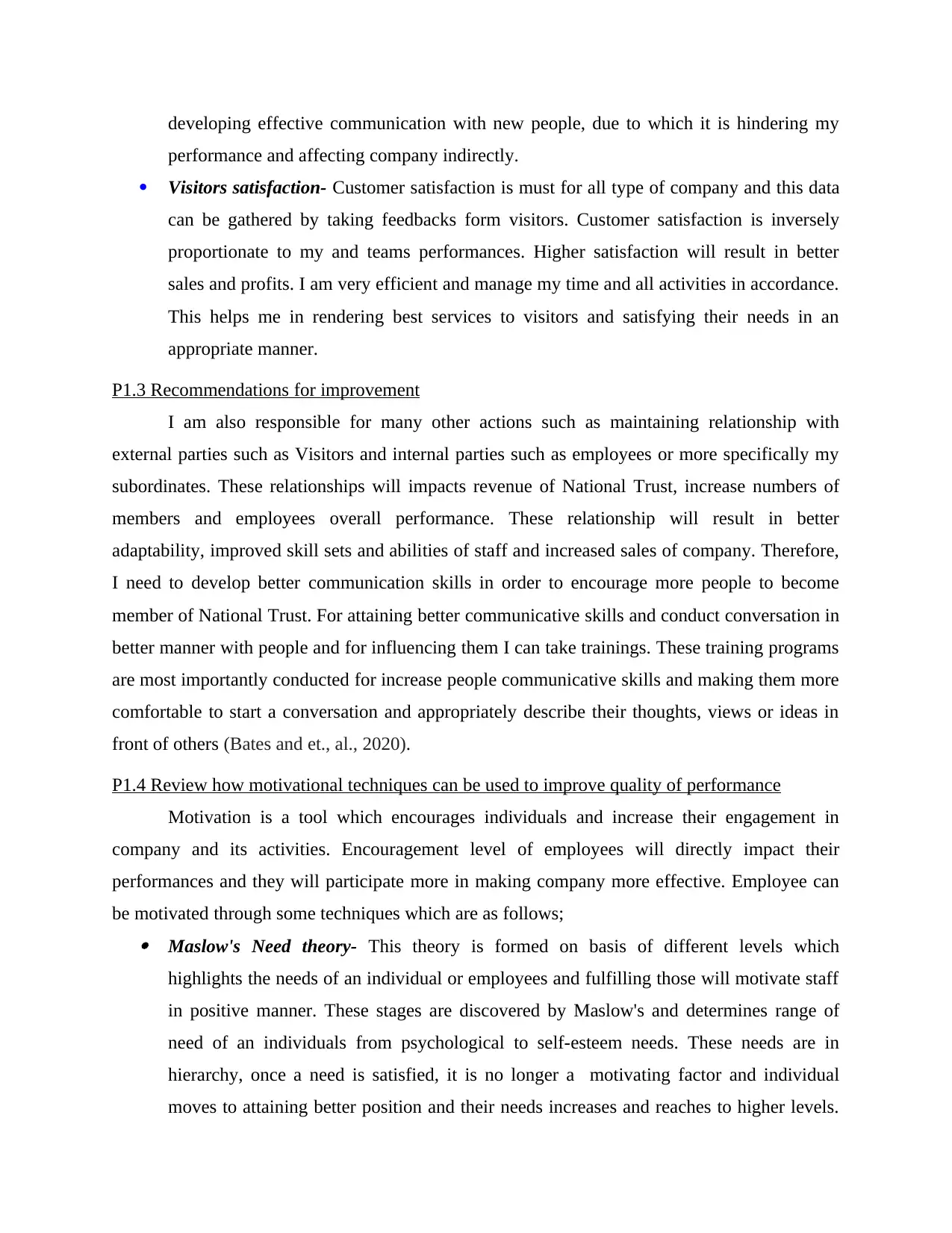
developing effective communication with new people, due to which it is hindering my
performance and affecting company indirectly.
Visitors satisfaction- Customer satisfaction is must for all type of company and this data
can be gathered by taking feedbacks form visitors. Customer satisfaction is inversely
proportionate to my and teams performances. Higher satisfaction will result in better
sales and profits. I am very efficient and manage my time and all activities in accordance.
This helps me in rendering best services to visitors and satisfying their needs in an
appropriate manner.
P1.3 Recommendations for improvement
I am also responsible for many other actions such as maintaining relationship with
external parties such as Visitors and internal parties such as employees or more specifically my
subordinates. These relationships will impacts revenue of National Trust, increase numbers of
members and employees overall performance. These relationship will result in better
adaptability, improved skill sets and abilities of staff and increased sales of company. Therefore,
I need to develop better communication skills in order to encourage more people to become
member of National Trust. For attaining better communicative skills and conduct conversation in
better manner with people and for influencing them I can take trainings. These training programs
are most importantly conducted for increase people communicative skills and making them more
comfortable to start a conversation and appropriately describe their thoughts, views or ideas in
front of others (Bates and et., al., 2020).
P1.4 Review how motivational techniques can be used to improve quality of performance
Motivation is a tool which encourages individuals and increase their engagement in
company and its activities. Encouragement level of employees will directly impact their
performances and they will participate more in making company more effective. Employee can
be motivated through some techniques which are as follows; Maslow's Need theory- This theory is formed on basis of different levels which
highlights the needs of an individual or employees and fulfilling those will motivate staff
in positive manner. These stages are discovered by Maslow's and determines range of
need of an individuals from psychological to self-esteem needs. These needs are in
hierarchy, once a need is satisfied, it is no longer a motivating factor and individual
moves to attaining better position and their needs increases and reaches to higher levels.
performance and affecting company indirectly.
Visitors satisfaction- Customer satisfaction is must for all type of company and this data
can be gathered by taking feedbacks form visitors. Customer satisfaction is inversely
proportionate to my and teams performances. Higher satisfaction will result in better
sales and profits. I am very efficient and manage my time and all activities in accordance.
This helps me in rendering best services to visitors and satisfying their needs in an
appropriate manner.
P1.3 Recommendations for improvement
I am also responsible for many other actions such as maintaining relationship with
external parties such as Visitors and internal parties such as employees or more specifically my
subordinates. These relationships will impacts revenue of National Trust, increase numbers of
members and employees overall performance. These relationship will result in better
adaptability, improved skill sets and abilities of staff and increased sales of company. Therefore,
I need to develop better communication skills in order to encourage more people to become
member of National Trust. For attaining better communicative skills and conduct conversation in
better manner with people and for influencing them I can take trainings. These training programs
are most importantly conducted for increase people communicative skills and making them more
comfortable to start a conversation and appropriately describe their thoughts, views or ideas in
front of others (Bates and et., al., 2020).
P1.4 Review how motivational techniques can be used to improve quality of performance
Motivation is a tool which encourages individuals and increase their engagement in
company and its activities. Encouragement level of employees will directly impact their
performances and they will participate more in making company more effective. Employee can
be motivated through some techniques which are as follows; Maslow's Need theory- This theory is formed on basis of different levels which
highlights the needs of an individual or employees and fulfilling those will motivate staff
in positive manner. These stages are discovered by Maslow's and determines range of
need of an individuals from psychological to self-esteem needs. These needs are in
hierarchy, once a need is satisfied, it is no longer a motivating factor and individual
moves to attaining better position and their needs increases and reaches to higher levels.
⊘ This is a preview!⊘
Do you want full access?
Subscribe today to unlock all pages.

Trusted by 1+ million students worldwide
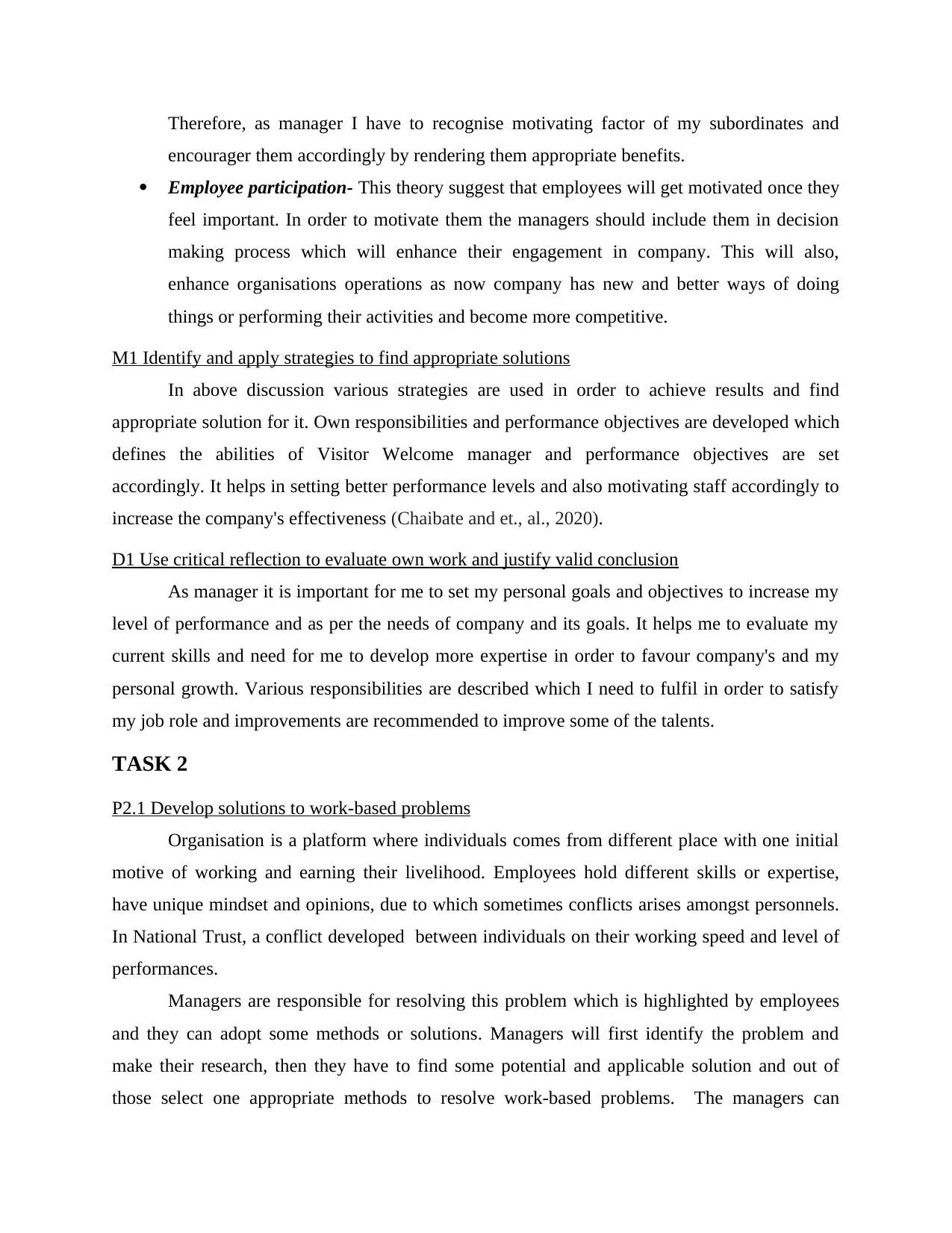
Therefore, as manager I have to recognise motivating factor of my subordinates and
encourager them accordingly by rendering them appropriate benefits.
Employee participation- This theory suggest that employees will get motivated once they
feel important. In order to motivate them the managers should include them in decision
making process which will enhance their engagement in company. This will also,
enhance organisations operations as now company has new and better ways of doing
things or performing their activities and become more competitive.
M1 Identify and apply strategies to find appropriate solutions
In above discussion various strategies are used in order to achieve results and find
appropriate solution for it. Own responsibilities and performance objectives are developed which
defines the abilities of Visitor Welcome manager and performance objectives are set
accordingly. It helps in setting better performance levels and also motivating staff accordingly to
increase the company's effectiveness (Chaibate and et., al., 2020).
D1 Use critical reflection to evaluate own work and justify valid conclusion
As manager it is important for me to set my personal goals and objectives to increase my
level of performance and as per the needs of company and its goals. It helps me to evaluate my
current skills and need for me to develop more expertise in order to favour company's and my
personal growth. Various responsibilities are described which I need to fulfil in order to satisfy
my job role and improvements are recommended to improve some of the talents.
TASK 2
P2.1 Develop solutions to work-based problems
Organisation is a platform where individuals comes from different place with one initial
motive of working and earning their livelihood. Employees hold different skills or expertise,
have unique mindset and opinions, due to which sometimes conflicts arises amongst personnels.
In National Trust, a conflict developed between individuals on their working speed and level of
performances.
Managers are responsible for resolving this problem which is highlighted by employees
and they can adopt some methods or solutions. Managers will first identify the problem and
make their research, then they have to find some potential and applicable solution and out of
those select one appropriate methods to resolve work-based problems. The managers can
encourager them accordingly by rendering them appropriate benefits.
Employee participation- This theory suggest that employees will get motivated once they
feel important. In order to motivate them the managers should include them in decision
making process which will enhance their engagement in company. This will also,
enhance organisations operations as now company has new and better ways of doing
things or performing their activities and become more competitive.
M1 Identify and apply strategies to find appropriate solutions
In above discussion various strategies are used in order to achieve results and find
appropriate solution for it. Own responsibilities and performance objectives are developed which
defines the abilities of Visitor Welcome manager and performance objectives are set
accordingly. It helps in setting better performance levels and also motivating staff accordingly to
increase the company's effectiveness (Chaibate and et., al., 2020).
D1 Use critical reflection to evaluate own work and justify valid conclusion
As manager it is important for me to set my personal goals and objectives to increase my
level of performance and as per the needs of company and its goals. It helps me to evaluate my
current skills and need for me to develop more expertise in order to favour company's and my
personal growth. Various responsibilities are described which I need to fulfil in order to satisfy
my job role and improvements are recommended to improve some of the talents.
TASK 2
P2.1 Develop solutions to work-based problems
Organisation is a platform where individuals comes from different place with one initial
motive of working and earning their livelihood. Employees hold different skills or expertise,
have unique mindset and opinions, due to which sometimes conflicts arises amongst personnels.
In National Trust, a conflict developed between individuals on their working speed and level of
performances.
Managers are responsible for resolving this problem which is highlighted by employees
and they can adopt some methods or solutions. Managers will first identify the problem and
make their research, then they have to find some potential and applicable solution and out of
those select one appropriate methods to resolve work-based problems. The managers can
Paraphrase This Document
Need a fresh take? Get an instant paraphrase of this document with our AI Paraphraser
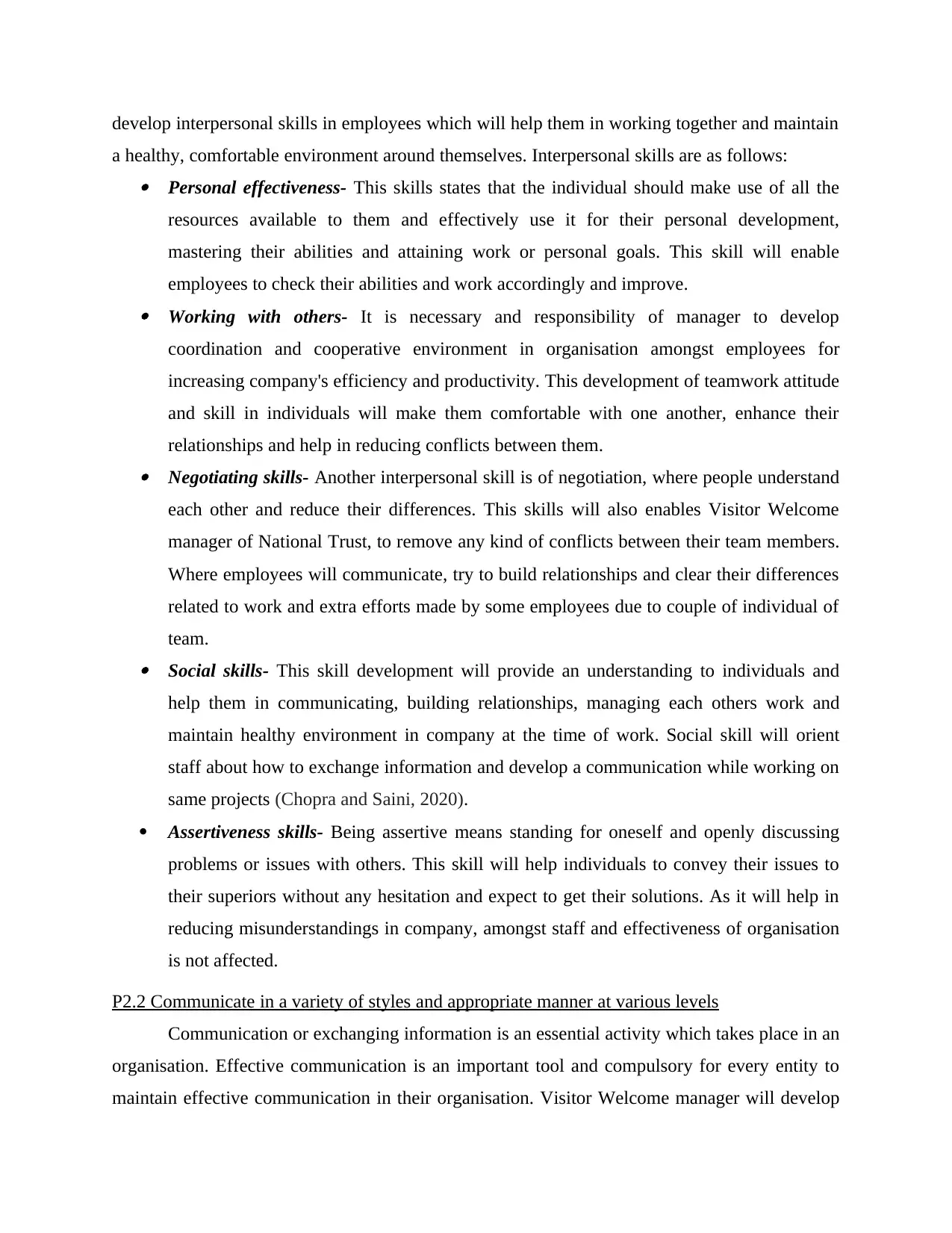
develop interpersonal skills in employees which will help them in working together and maintain
a healthy, comfortable environment around themselves. Interpersonal skills are as follows: Personal effectiveness- This skills states that the individual should make use of all the
resources available to them and effectively use it for their personal development,
mastering their abilities and attaining work or personal goals. This skill will enable
employees to check their abilities and work accordingly and improve. Working with others- It is necessary and responsibility of manager to develop
coordination and cooperative environment in organisation amongst employees for
increasing company's efficiency and productivity. This development of teamwork attitude
and skill in individuals will make them comfortable with one another, enhance their
relationships and help in reducing conflicts between them. Negotiating skills- Another interpersonal skill is of negotiation, where people understand
each other and reduce their differences. This skills will also enables Visitor Welcome
manager of National Trust, to remove any kind of conflicts between their team members.
Where employees will communicate, try to build relationships and clear their differences
related to work and extra efforts made by some employees due to couple of individual of
team. Social skills- This skill development will provide an understanding to individuals and
help them in communicating, building relationships, managing each others work and
maintain healthy environment in company at the time of work. Social skill will orient
staff about how to exchange information and develop a communication while working on
same projects (Chopra and Saini, 2020).
Assertiveness skills- Being assertive means standing for oneself and openly discussing
problems or issues with others. This skill will help individuals to convey their issues to
their superiors without any hesitation and expect to get their solutions. As it will help in
reducing misunderstandings in company, amongst staff and effectiveness of organisation
is not affected.
P2.2 Communicate in a variety of styles and appropriate manner at various levels
Communication or exchanging information is an essential activity which takes place in an
organisation. Effective communication is an important tool and compulsory for every entity to
maintain effective communication in their organisation. Visitor Welcome manager will develop
a healthy, comfortable environment around themselves. Interpersonal skills are as follows: Personal effectiveness- This skills states that the individual should make use of all the
resources available to them and effectively use it for their personal development,
mastering their abilities and attaining work or personal goals. This skill will enable
employees to check their abilities and work accordingly and improve. Working with others- It is necessary and responsibility of manager to develop
coordination and cooperative environment in organisation amongst employees for
increasing company's efficiency and productivity. This development of teamwork attitude
and skill in individuals will make them comfortable with one another, enhance their
relationships and help in reducing conflicts between them. Negotiating skills- Another interpersonal skill is of negotiation, where people understand
each other and reduce their differences. This skills will also enables Visitor Welcome
manager of National Trust, to remove any kind of conflicts between their team members.
Where employees will communicate, try to build relationships and clear their differences
related to work and extra efforts made by some employees due to couple of individual of
team. Social skills- This skill development will provide an understanding to individuals and
help them in communicating, building relationships, managing each others work and
maintain healthy environment in company at the time of work. Social skill will orient
staff about how to exchange information and develop a communication while working on
same projects (Chopra and Saini, 2020).
Assertiveness skills- Being assertive means standing for oneself and openly discussing
problems or issues with others. This skill will help individuals to convey their issues to
their superiors without any hesitation and expect to get their solutions. As it will help in
reducing misunderstandings in company, amongst staff and effectiveness of organisation
is not affected.
P2.2 Communicate in a variety of styles and appropriate manner at various levels
Communication or exchanging information is an essential activity which takes place in an
organisation. Effective communication is an important tool and compulsory for every entity to
maintain effective communication in their organisation. Visitor Welcome manager will develop
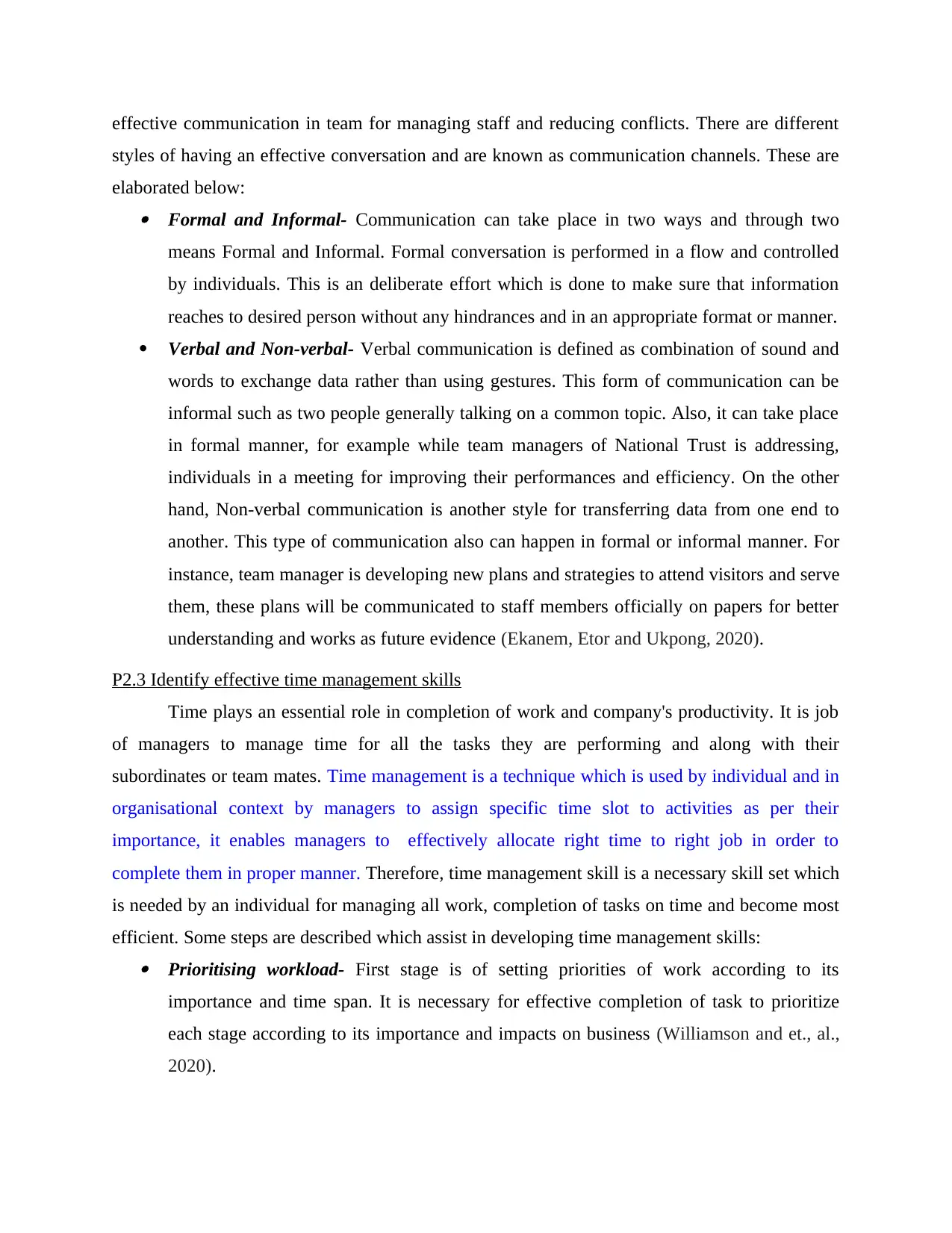
effective communication in team for managing staff and reducing conflicts. There are different
styles of having an effective conversation and are known as communication channels. These are
elaborated below: Formal and Informal- Communication can take place in two ways and through two
means Formal and Informal. Formal conversation is performed in a flow and controlled
by individuals. This is an deliberate effort which is done to make sure that information
reaches to desired person without any hindrances and in an appropriate format or manner.
Verbal and Non-verbal- Verbal communication is defined as combination of sound and
words to exchange data rather than using gestures. This form of communication can be
informal such as two people generally talking on a common topic. Also, it can take place
in formal manner, for example while team managers of National Trust is addressing,
individuals in a meeting for improving their performances and efficiency. On the other
hand, Non-verbal communication is another style for transferring data from one end to
another. This type of communication also can happen in formal or informal manner. For
instance, team manager is developing new plans and strategies to attend visitors and serve
them, these plans will be communicated to staff members officially on papers for better
understanding and works as future evidence (Ekanem, Etor and Ukpong, 2020).
P2.3 Identify effective time management skills
Time plays an essential role in completion of work and company's productivity. It is job
of managers to manage time for all the tasks they are performing and along with their
subordinates or team mates. Time management is a technique which is used by individual and in
organisational context by managers to assign specific time slot to activities as per their
importance, it enables managers to effectively allocate right time to right job in order to
complete them in proper manner. Therefore, time management skill is a necessary skill set which
is needed by an individual for managing all work, completion of tasks on time and become most
efficient. Some steps are described which assist in developing time management skills: Prioritising workload- First stage is of setting priorities of work according to its
importance and time span. It is necessary for effective completion of task to prioritize
each stage according to its importance and impacts on business (Williamson and et., al.,
2020).
styles of having an effective conversation and are known as communication channels. These are
elaborated below: Formal and Informal- Communication can take place in two ways and through two
means Formal and Informal. Formal conversation is performed in a flow and controlled
by individuals. This is an deliberate effort which is done to make sure that information
reaches to desired person without any hindrances and in an appropriate format or manner.
Verbal and Non-verbal- Verbal communication is defined as combination of sound and
words to exchange data rather than using gestures. This form of communication can be
informal such as two people generally talking on a common topic. Also, it can take place
in formal manner, for example while team managers of National Trust is addressing,
individuals in a meeting for improving their performances and efficiency. On the other
hand, Non-verbal communication is another style for transferring data from one end to
another. This type of communication also can happen in formal or informal manner. For
instance, team manager is developing new plans and strategies to attend visitors and serve
them, these plans will be communicated to staff members officially on papers for better
understanding and works as future evidence (Ekanem, Etor and Ukpong, 2020).
P2.3 Identify effective time management skills
Time plays an essential role in completion of work and company's productivity. It is job
of managers to manage time for all the tasks they are performing and along with their
subordinates or team mates. Time management is a technique which is used by individual and in
organisational context by managers to assign specific time slot to activities as per their
importance, it enables managers to effectively allocate right time to right job in order to
complete them in proper manner. Therefore, time management skill is a necessary skill set which
is needed by an individual for managing all work, completion of tasks on time and become most
efficient. Some steps are described which assist in developing time management skills: Prioritising workload- First stage is of setting priorities of work according to its
importance and time span. It is necessary for effective completion of task to prioritize
each stage according to its importance and impacts on business (Williamson and et., al.,
2020).
⊘ This is a preview!⊘
Do you want full access?
Subscribe today to unlock all pages.

Trusted by 1+ million students worldwide
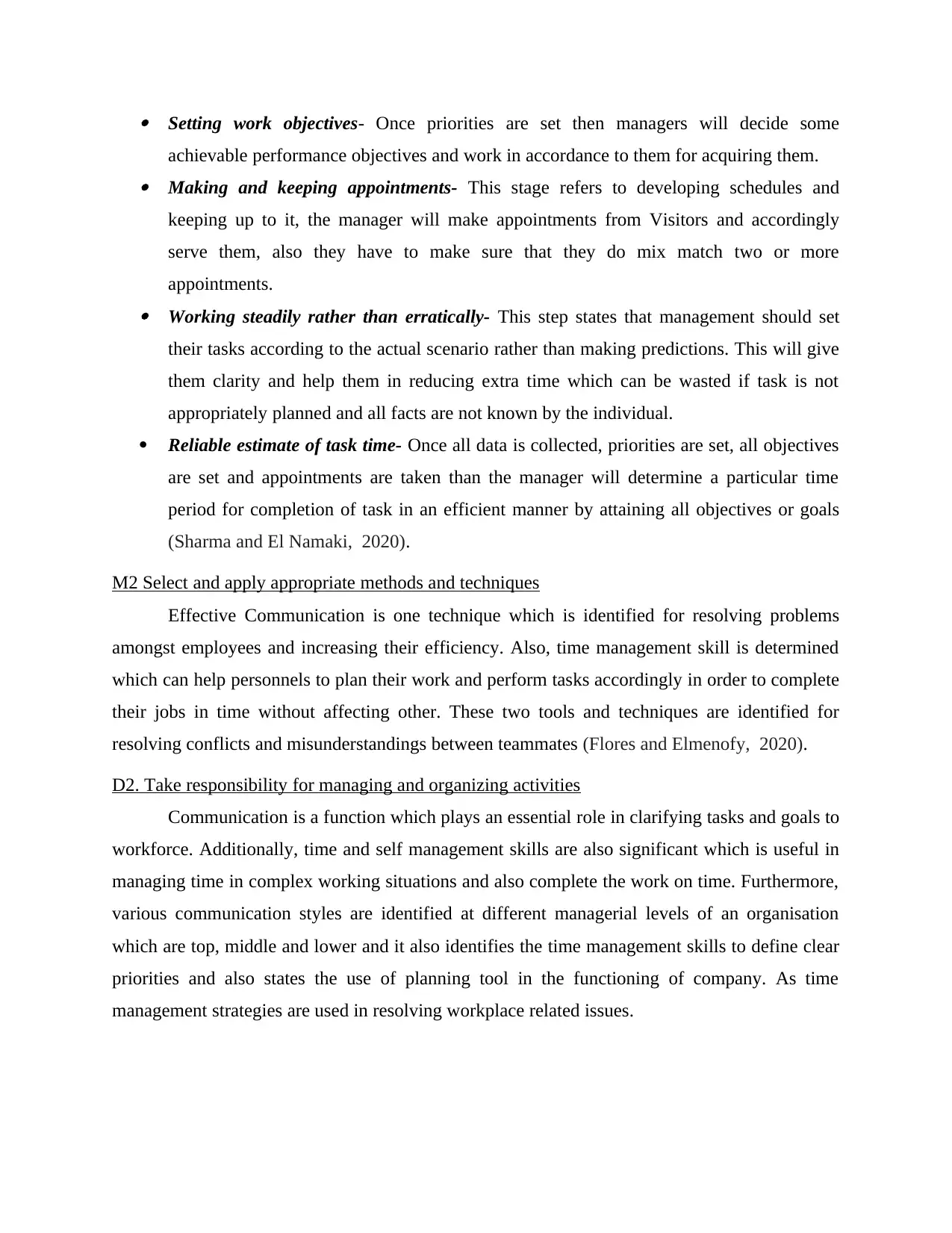
Setting work objectives- Once priorities are set then managers will decide some
achievable performance objectives and work in accordance to them for acquiring them. Making and keeping appointments- This stage refers to developing schedules and
keeping up to it, the manager will make appointments from Visitors and accordingly
serve them, also they have to make sure that they do mix match two or more
appointments. Working steadily rather than erratically- This step states that management should set
their tasks according to the actual scenario rather than making predictions. This will give
them clarity and help them in reducing extra time which can be wasted if task is not
appropriately planned and all facts are not known by the individual.
Reliable estimate of task time- Once all data is collected, priorities are set, all objectives
are set and appointments are taken than the manager will determine a particular time
period for completion of task in an efficient manner by attaining all objectives or goals
(Sharma and El Namaki, 2020).
M2 Select and apply appropriate methods and techniques
Effective Communication is one technique which is identified for resolving problems
amongst employees and increasing their efficiency. Also, time management skill is determined
which can help personnels to plan their work and perform tasks accordingly in order to complete
their jobs in time without affecting other. These two tools and techniques are identified for
resolving conflicts and misunderstandings between teammates (Flores and Elmenofy, 2020).
D2. Take responsibility for managing and organizing activities
Communication is a function which plays an essential role in clarifying tasks and goals to
workforce. Additionally, time and self management skills are also significant which is useful in
managing time in complex working situations and also complete the work on time. Furthermore,
various communication styles are identified at different managerial levels of an organisation
which are top, middle and lower and it also identifies the time management skills to define clear
priorities and also states the use of planning tool in the functioning of company. As time
management strategies are used in resolving workplace related issues.
achievable performance objectives and work in accordance to them for acquiring them. Making and keeping appointments- This stage refers to developing schedules and
keeping up to it, the manager will make appointments from Visitors and accordingly
serve them, also they have to make sure that they do mix match two or more
appointments. Working steadily rather than erratically- This step states that management should set
their tasks according to the actual scenario rather than making predictions. This will give
them clarity and help them in reducing extra time which can be wasted if task is not
appropriately planned and all facts are not known by the individual.
Reliable estimate of task time- Once all data is collected, priorities are set, all objectives
are set and appointments are taken than the manager will determine a particular time
period for completion of task in an efficient manner by attaining all objectives or goals
(Sharma and El Namaki, 2020).
M2 Select and apply appropriate methods and techniques
Effective Communication is one technique which is identified for resolving problems
amongst employees and increasing their efficiency. Also, time management skill is determined
which can help personnels to plan their work and perform tasks accordingly in order to complete
their jobs in time without affecting other. These two tools and techniques are identified for
resolving conflicts and misunderstandings between teammates (Flores and Elmenofy, 2020).
D2. Take responsibility for managing and organizing activities
Communication is a function which plays an essential role in clarifying tasks and goals to
workforce. Additionally, time and self management skills are also significant which is useful in
managing time in complex working situations and also complete the work on time. Furthermore,
various communication styles are identified at different managerial levels of an organisation
which are top, middle and lower and it also identifies the time management skills to define clear
priorities and also states the use of planning tool in the functioning of company. As time
management strategies are used in resolving workplace related issues.
Paraphrase This Document
Need a fresh take? Get an instant paraphrase of this document with our AI Paraphraser
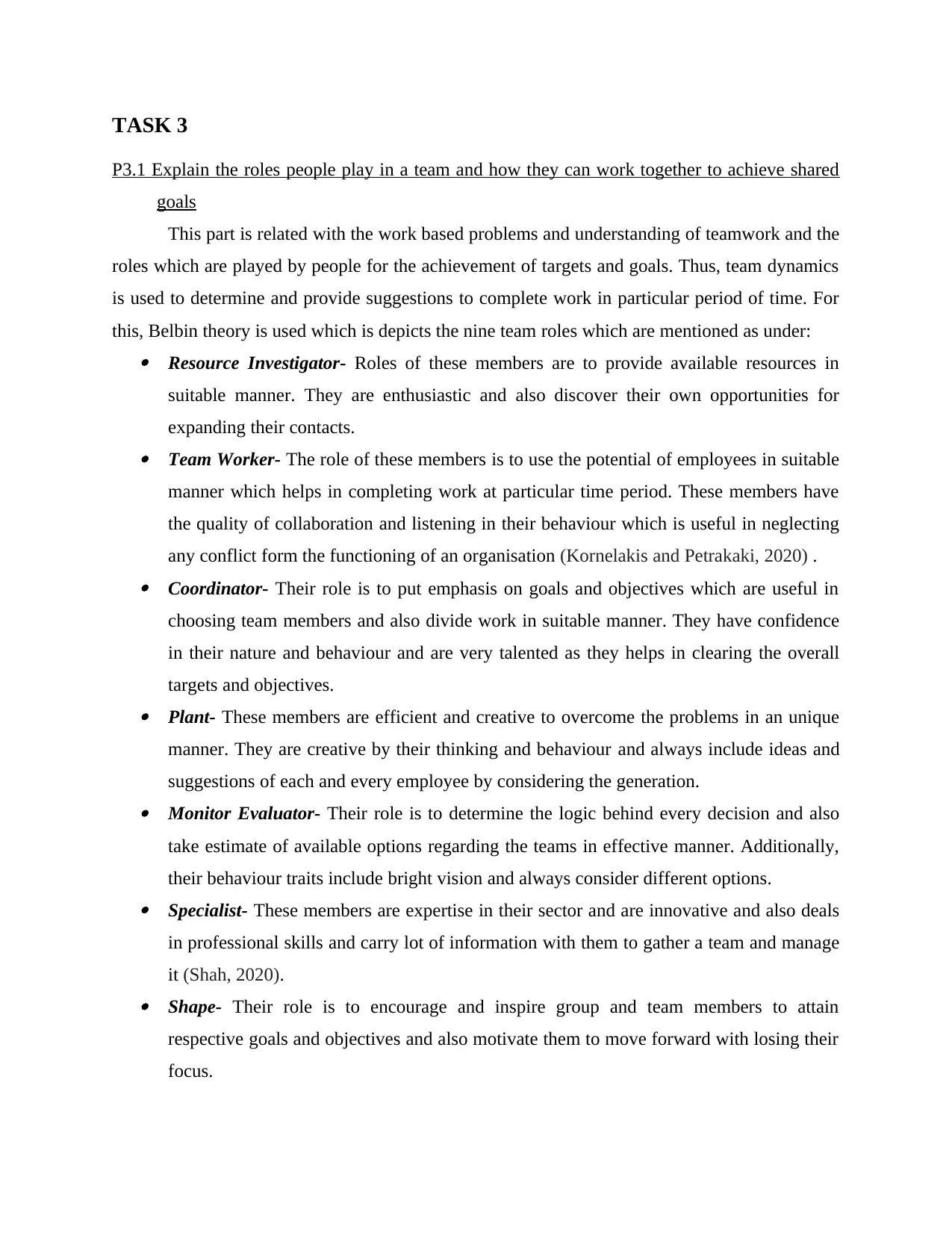
TASK 3
P3.1 Explain the roles people play in a team and how they can work together to achieve shared
goals
This part is related with the work based problems and understanding of teamwork and the
roles which are played by people for the achievement of targets and goals. Thus, team dynamics
is used to determine and provide suggestions to complete work in particular period of time. For
this, Belbin theory is used which is depicts the nine team roles which are mentioned as under: Resource Investigator- Roles of these members are to provide available resources in
suitable manner. They are enthusiastic and also discover their own opportunities for
expanding their contacts. Team Worker- The role of these members is to use the potential of employees in suitable
manner which helps in completing work at particular time period. These members have
the quality of collaboration and listening in their behaviour which is useful in neglecting
any conflict form the functioning of an organisation (Kornelakis and Petrakaki, 2020) . Coordinator- Their role is to put emphasis on goals and objectives which are useful in
choosing team members and also divide work in suitable manner. They have confidence
in their nature and behaviour and are very talented as they helps in clearing the overall
targets and objectives. Plant- These members are efficient and creative to overcome the problems in an unique
manner. They are creative by their thinking and behaviour and always include ideas and
suggestions of each and every employee by considering the generation. Monitor Evaluator- Their role is to determine the logic behind every decision and also
take estimate of available options regarding the teams in effective manner. Additionally,
their behaviour traits include bright vision and always consider different options. Specialist- These members are expertise in their sector and are innovative and also deals
in professional skills and carry lot of information with them to gather a team and manage
it (Shah, 2020). Shape- Their role is to encourage and inspire group and team members to attain
respective goals and objectives and also motivate them to move forward with losing their
focus.
P3.1 Explain the roles people play in a team and how they can work together to achieve shared
goals
This part is related with the work based problems and understanding of teamwork and the
roles which are played by people for the achievement of targets and goals. Thus, team dynamics
is used to determine and provide suggestions to complete work in particular period of time. For
this, Belbin theory is used which is depicts the nine team roles which are mentioned as under: Resource Investigator- Roles of these members are to provide available resources in
suitable manner. They are enthusiastic and also discover their own opportunities for
expanding their contacts. Team Worker- The role of these members is to use the potential of employees in suitable
manner which helps in completing work at particular time period. These members have
the quality of collaboration and listening in their behaviour which is useful in neglecting
any conflict form the functioning of an organisation (Kornelakis and Petrakaki, 2020) . Coordinator- Their role is to put emphasis on goals and objectives which are useful in
choosing team members and also divide work in suitable manner. They have confidence
in their nature and behaviour and are very talented as they helps in clearing the overall
targets and objectives. Plant- These members are efficient and creative to overcome the problems in an unique
manner. They are creative by their thinking and behaviour and always include ideas and
suggestions of each and every employee by considering the generation. Monitor Evaluator- Their role is to determine the logic behind every decision and also
take estimate of available options regarding the teams in effective manner. Additionally,
their behaviour traits include bright vision and always consider different options. Specialist- These members are expertise in their sector and are innovative and also deals
in professional skills and carry lot of information with them to gather a team and manage
it (Shah, 2020). Shape- Their role is to encourage and inspire group and team members to attain
respective goals and objectives and also motivate them to move forward with losing their
focus.
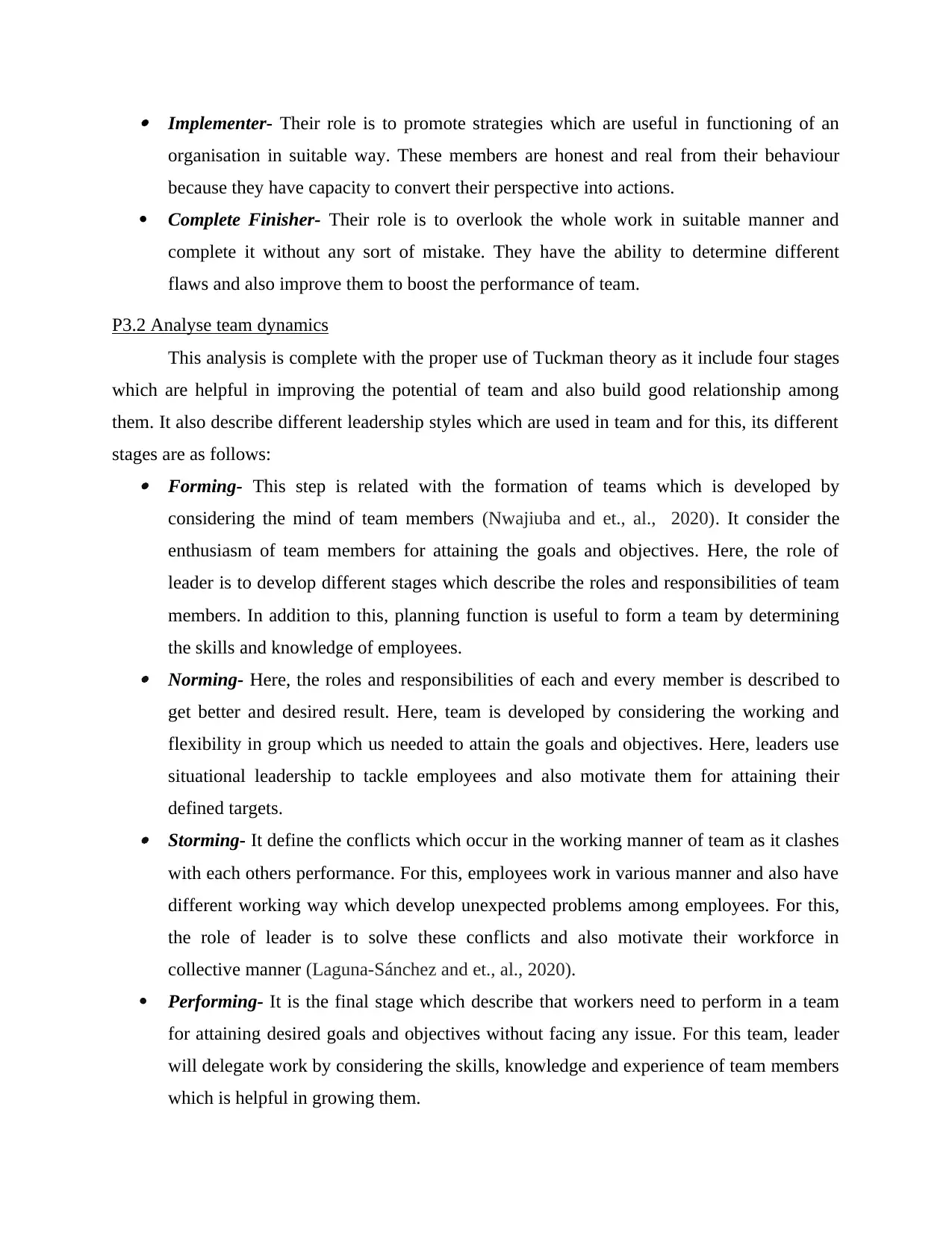
Implementer- Their role is to promote strategies which are useful in functioning of an
organisation in suitable way. These members are honest and real from their behaviour
because they have capacity to convert their perspective into actions.
Complete Finisher- Their role is to overlook the whole work in suitable manner and
complete it without any sort of mistake. They have the ability to determine different
flaws and also improve them to boost the performance of team.
P3.2 Analyse team dynamics
This analysis is complete with the proper use of Tuckman theory as it include four stages
which are helpful in improving the potential of team and also build good relationship among
them. It also describe different leadership styles which are used in team and for this, its different
stages are as follows: Forming- This step is related with the formation of teams which is developed by
considering the mind of team members (Nwajiuba and et., al., 2020). It consider the
enthusiasm of team members for attaining the goals and objectives. Here, the role of
leader is to develop different stages which describe the roles and responsibilities of team
members. In addition to this, planning function is useful to form a team by determining
the skills and knowledge of employees. Norming- Here, the roles and responsibilities of each and every member is described to
get better and desired result. Here, team is developed by considering the working and
flexibility in group which us needed to attain the goals and objectives. Here, leaders use
situational leadership to tackle employees and also motivate them for attaining their
defined targets. Storming- It define the conflicts which occur in the working manner of team as it clashes
with each others performance. For this, employees work in various manner and also have
different working way which develop unexpected problems among employees. For this,
the role of leader is to solve these conflicts and also motivate their workforce in
collective manner (Laguna-Sánchez and et., al., 2020).
Performing- It is the final stage which describe that workers need to perform in a team
for attaining desired goals and objectives without facing any issue. For this team, leader
will delegate work by considering the skills, knowledge and experience of team members
which is helpful in growing them.
organisation in suitable way. These members are honest and real from their behaviour
because they have capacity to convert their perspective into actions.
Complete Finisher- Their role is to overlook the whole work in suitable manner and
complete it without any sort of mistake. They have the ability to determine different
flaws and also improve them to boost the performance of team.
P3.2 Analyse team dynamics
This analysis is complete with the proper use of Tuckman theory as it include four stages
which are helpful in improving the potential of team and also build good relationship among
them. It also describe different leadership styles which are used in team and for this, its different
stages are as follows: Forming- This step is related with the formation of teams which is developed by
considering the mind of team members (Nwajiuba and et., al., 2020). It consider the
enthusiasm of team members for attaining the goals and objectives. Here, the role of
leader is to develop different stages which describe the roles and responsibilities of team
members. In addition to this, planning function is useful to form a team by determining
the skills and knowledge of employees. Norming- Here, the roles and responsibilities of each and every member is described to
get better and desired result. Here, team is developed by considering the working and
flexibility in group which us needed to attain the goals and objectives. Here, leaders use
situational leadership to tackle employees and also motivate them for attaining their
defined targets. Storming- It define the conflicts which occur in the working manner of team as it clashes
with each others performance. For this, employees work in various manner and also have
different working way which develop unexpected problems among employees. For this,
the role of leader is to solve these conflicts and also motivate their workforce in
collective manner (Laguna-Sánchez and et., al., 2020).
Performing- It is the final stage which describe that workers need to perform in a team
for attaining desired goals and objectives without facing any issue. For this team, leader
will delegate work by considering the skills, knowledge and experience of team members
which is helpful in growing them.
⊘ This is a preview!⊘
Do you want full access?
Subscribe today to unlock all pages.

Trusted by 1+ million students worldwide
1 out of 18
Related Documents
Your All-in-One AI-Powered Toolkit for Academic Success.
+13062052269
info@desklib.com
Available 24*7 on WhatsApp / Email
![[object Object]](/_next/static/media/star-bottom.7253800d.svg)
Unlock your academic potential
Copyright © 2020–2026 A2Z Services. All Rights Reserved. Developed and managed by ZUCOL.

